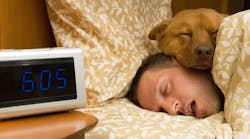Do you or your patients get a good night's sleep? Overall, our society doesn’t value a solid night of sleep as much as we should. As we learn more about it, a good night's sleep leads to better health, yet more than one billion people worldwide stop breathing in their sleep, anywhere from six to 60 times a night! This obviously does not lead to a good night of rest.
When a person sleeps well, they cleanse and detoxify their brain, lower blood pressure, heal, and recharge. Never attaining that good nights’ sleep leads to poor health outcomes. I could go on and on, but you can read more about what the loss of sleep does in my blog about sleep.
Let’s move over to some solutions. My first recommendation is good sleep hygiene. This includes cutting out or reducing items such as liquor and caffeine shortly before going to bed. Then, how about establishing a regular exercise routine, finishing dinner at least three hours before bed, keeping screentime right before bed to a minimum, and maybe even keeping Spot or Fluffy out of your room during the night.
Then there are sleep apps, which can really help guide people in their quest for a better night's sleep. Sleep studies by professionals have shown many people what to do for better sleep and health.
But here’s a simple solution you may not have even heard of and it can lead to surprising results—mouth tape. That’s right. You and your patients can buy simple paper tape at the drugstore to tape the mouth shut, which prevents it from falling open and interrupting sleep. The nose is the only part of our body we should be using to breathe. The tape was a revelation for me personally, and I can confidently recommend it to others.
Read my article about sleep to get some terrific tips that will help you and your patients.
Read more by Barbara on RDH
Making new dental routines a lifelong habit
Want a perfect kiss? Start with oral health
Barbara Tritz, MSB, BSDATE, RDH, is a biological dental hygienist and orofacial myofunctional therapist whose blog, Queen of Dental Hygiene, provides patients the information they need to help them on their healing journey. “Our one-hour appointment time was just not long enough to share all the many important facts I wanted our patients to learn. Dental hygiene is about so much more than just teaching brushing and flossing," says Barbara. “We are healers, educators, and lifesavers, and we need to give our patients the tools and skills to empower them to true wellness and health.”






